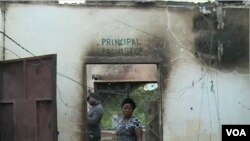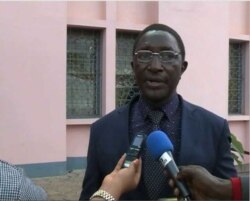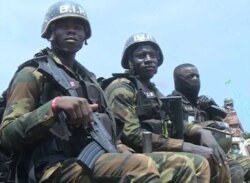Cameroon says armed separatists are occupying more than 50 schools in its western English-speaking regions, using them for training and to hide from the military. The alleged occupation could complicate government plans to restart education in the regions in September.
"We have about 48 schools that have been destroyed in our system and another 53 schools that are occupied presently," Cameroon’s basic education chief for the northwest region, Wilfred Wambeng Ndong, told reporters Sunday. "As regards our teachers, we are doubting the whereabouts of more than 3,000 teachers for the schools that are not going (working).”
Ndong said most of the missing teachers probably escaped to safer areas in French-speaking regions or are hiding in the bush. He said school attendance in the region has dropped from 422,000 in 2017 to 5,500 this year – and is mostly in safer towns like Bamenda and Nkambe.
Cameroon separatists in social media posts denied they are occupying the schools but said they were deployed to areas prone to military attacks. The Anglophone rebels have attacked numerous schools over the past two years, in some cases abducting teachers and students.
The commander of government troops in the northwest, General Robbinson Agha, says the military will make sure all schools are safe before September 3, when the school year begins.
He says soldiers will kill all rebels who fail to disarm and surrender.
"We have got firm instructions from the hierarchy to pursue them right at their hideouts. This situation has to come to an end," he said. "We cannot accept that people cut (destroy) roads, burn bridges, burn schools."
Cameroon says the rebels have torched more than 130 schools while the separatists accuse the military of burning the schools to flush them out of hiding.
The military has denied the accusation.
For the past month, the government and civic society groups have called for the schools to reopen. Jude Mbaku, a campaigner for the Educate Them Now movement, says it is vital for both troops and rebels to consider schools no-go zones.
"Belligerents of the crisis in the Northwest and the Southwest regions are not doing enough to ensure the rights to education," he said. "We call for a cease fire and stop (to) all the attacks on educational structures, on learners and on teachers."
The conflict in Cameroon’s English-speaking regions started in 2016 when teachers and lawyers protested the dominance of French language and officials in the bilingual country.
Armed separatists in 2017 began demanding a separate English-speaking state, saying they would make the area ungovernable.
More than 2,000 people, including soldiers and police, have been killed in mounting violence since.






